Get Familiar: Chris Carrier
XLR8R shines a light on one of house music's unsung heroes, who also provides an exclusive bundle of music.
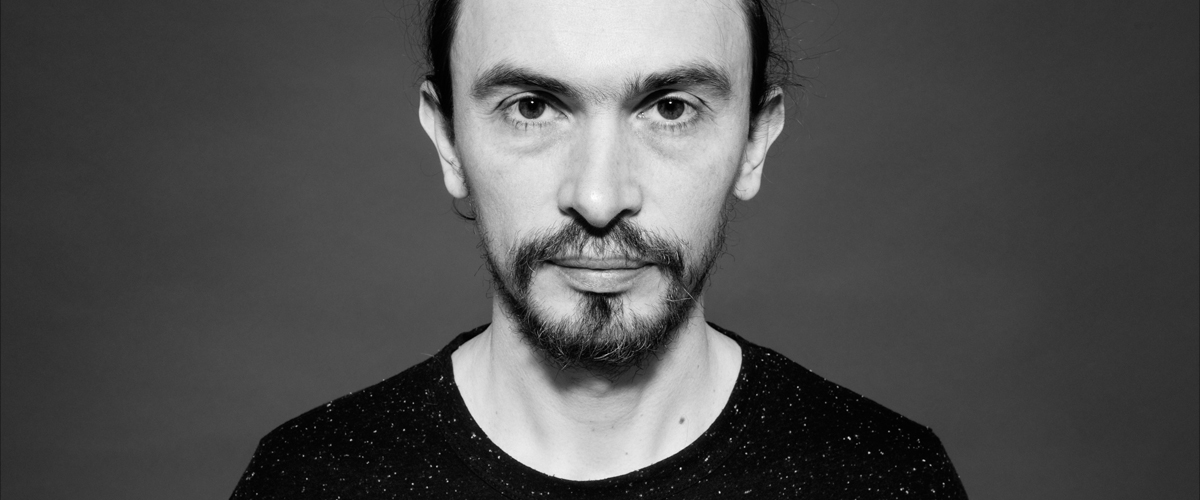
Get Familiar: Chris Carrier
XLR8R shines a light on one of house music's unsung heroes, who also provides an exclusive bundle of music.

Chris Carrier is an artist in the truest sense of the word. He creates not for the glamour of doing so, but rather due to an innate need to do so. However, even though he has an almost unfathomable release rate—scattered across some of house music’s premiere labels, including Robsoul, Apollonia, Hudd Traxx, Slapfunk, and Spectral Sound—you’d be easily forgiven for not recognizing the name. But that’s the way he wants it to be. He wants to be known for his music, and his music alone. Although mostly club-focused, the music Carrier produces and plays out is drenched in soul and held together by timeless, swinging grooves. It has just the right amount of bass weight to move any dancefloor, and enough intricate subtleties to keep the heads happy. In short, Carrier is one of house music’s biggest unsung heroes.
Based in the thriving Paris scene, Carrier’s career kicked off with the release of his first EP back in 1994. Shortly thereafter, he linked up with Guillaume la Tortue, one the scene’s leading pioneers, who guided Carrier in the early stages of his career, acting as something of a mentor to the burgeoning artist. The pair would go on to co-found the seminal Chronobrain, a techno-focused imprint responsible for some of the most played and treasured tracks from that era—and since then, Carrier has gone on to found countless more, including Combustible, Taka, X86, and Sound Carrier. The latest in that line, the minimal-focused Adult Only Shape, just hit its fifth release, a bumping micro-house exploration by Carrier under his Monsieur Georget moniker titled Monsieur Georget L’Album. Surprisingly, for a veteran with over 20 years in the game, his output does not seem to be slowing down at all, which harks back to his intrinsic need to produce music—it’s an almost uncontrollable quality of his persona that barely lets him sleep. Couple that with a hardware relationship that most producers would kill for, and you have a house music powerhouse intent on wringing every ounce of creativity out of his psyche, something for which we must all be thankful.
The Parisian scene in which he operates is undoubtedly a driving force in Carrier’s career. Surrounded by a network of family-like producers that includes Phil Weeks, DJ W!LD, and Dan Ghenacia, his long-time home base has proven to be a creative catalyst full of like-minded artists—most of which he has collaborated with in the past, the latest being 2015’s Just a Sin EP with Ghenacia. With another string of releases on the way, we thought that the time was right to shine a long overdue light on this influential artist—so over Skype, we chatted on his beginnings, his current studio and live setups, and his insatiable love of bicycles. You can also download two exclusive tracks and two mixes via the WeTransfer button below.
So, how did it all begin for you? How did you get into electronic music?
It was the beginning of the 90s when breakbeats hit—that’s what started the love. Everything was new and there were a lot of influences with electronic and dance. Before that, I was just into hip hop and rock, but then finally I saw the light. So from there, I got decks and a stack of vinyl and then I would sample. And I was lucky because my father was a musician and had a studio space in the house. So I started to work in the studio and at the same time I started to mix. I had a little knowledge and background, mostly from the conservatory of music where learnt a little bit of piano and music. But I moved really far away from that world and was more into skateboards and that sort of stuff—but I only returned to music once I found electronic music. From there, I started school for sound engineering, because back then, it was hard to produce. Now you have lots of gear and computers, but at this time, it was only analog stuff and mixing on the table.
What gear did your father have in the studio?
He had all the good stuff as he was dabbling in dance music and garage. So the 909 and the 808 and all that great gear.
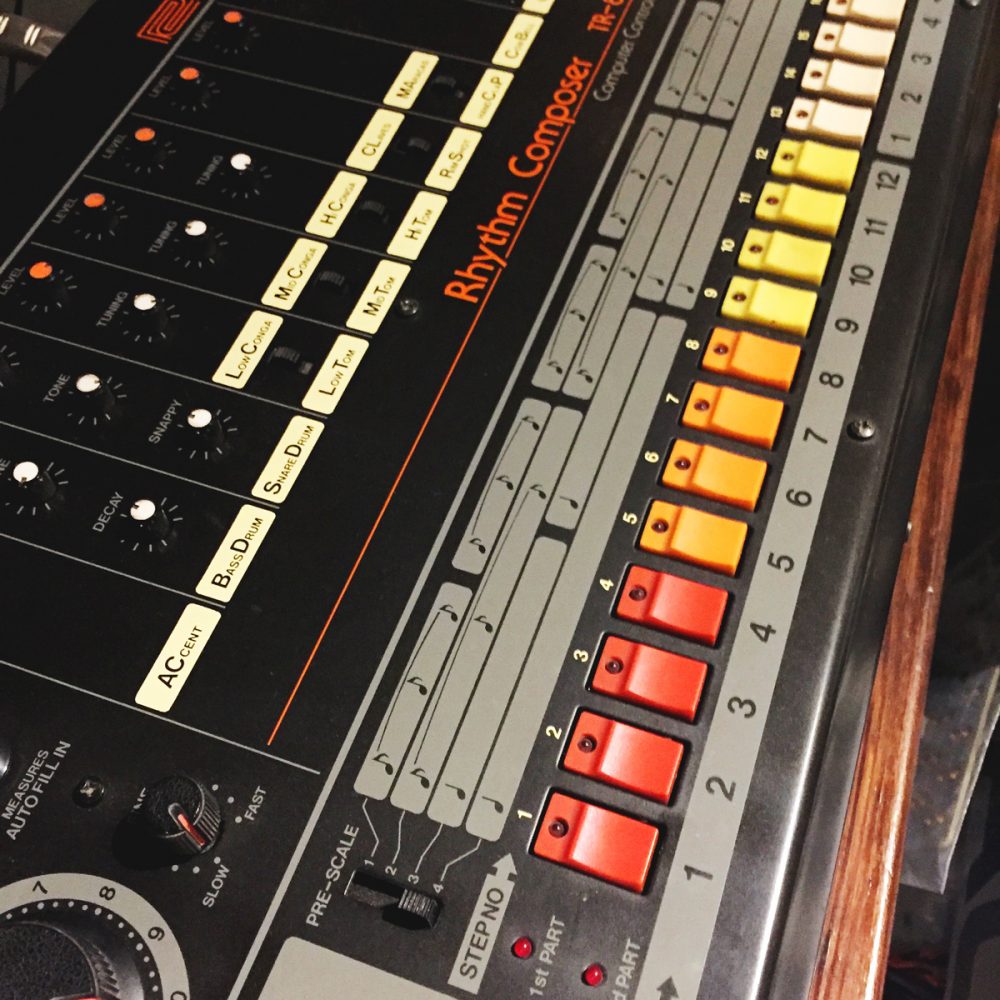
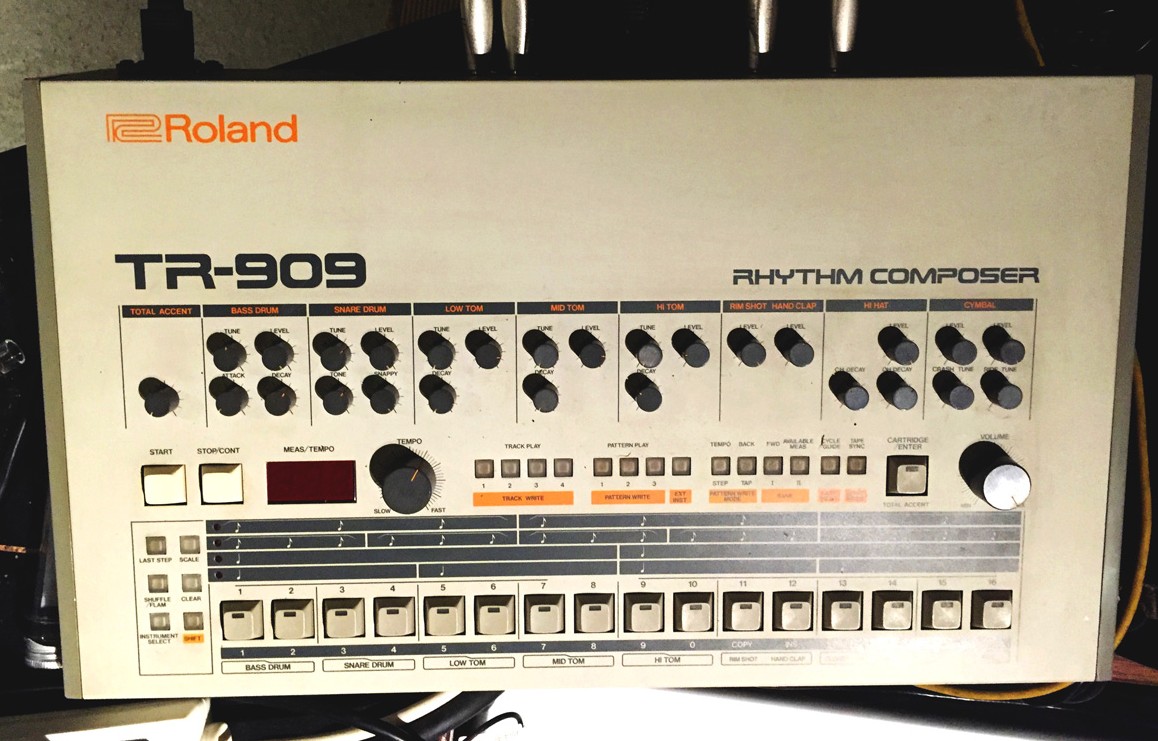
Did you inherit his gear, or go your own way and build your own studio?
Yeah, I inherited two or three pieces, but mostly went my own way. I started buying bits slowly. In Paris, we would all share our gear. You would use something and then pass it on. At the time, I was sharing a studio with Guillaume La Tortue—he was a pioneer in France and we bought a lot of machines with the company that we had.
And you worked on a few labels together?
Yeah, for techno releases we had Chronobrain, and for tech-house we created Combustible and Taka. A little after that I started Adult Only, which Guillaume would help with sometimes, but it was more my thing, with a focus on ’90s house and after-party-focused house. This is the main outlet that I’m running. We’re getting close to the 50th release. Adult Only 044 is a collaboration with Dan Ghenacia and includes a remix by Diego Krause—and the current one is from Julian Alexander.
And your new label is Adult Only Shape?
Yeah, so I started this because I’ve been doing minimal for so long. From the very beginning I have been listening to people like DBX and Ricardo [Villalobos] and all those guys—and I’ve had music that I couldn’t release for a long time due to it not fitting my “sound.”So I started this new division, and the first release was from Funk E. I’ve known Funk E for a long, long time—we actually met in Bucharest. He was playing house and over time he has sent me a lot of music, but it was not in my style to release. Then one day I had a record from him, and it was totally different, so I called him for more music like this and we worked on the first release for Adult Only Shape. Now the label is at 5 releases.
I also have my techno-focused label Sound Carrier. At the moment, I’m releasing a new series of five—I did five already—and the concept is based around space and the sea. The artwork and the music will fit together and will be released on five records.
You’ve recently started playing live as Monsieur Georget. Is that the first live show you’ve done?
I played live before Georget, with Hector Morales from San Francisco. We also did an LP together on Apollonia, called Lotus Seven. And before that, I did a little live thing with DJ W!LD, and I think we might do it again in the future. It’s really cool to do the live thing with a friend. With Georget, I focus on a modular set up and some other gear, like the Korg ER-1—but now I think I’ll change it a bit more, but with the same style of music.
So the modular is the centerpiece of the live set up?
Yes, before I focused on the MPC but now it’s mainly the modular.
“My sound is very diverse, so I always have to find a different name otherwise people get confused. But for me, it seems the same—just under a different name.”
Monsieur Georget is quite removed from your work under Chris Carrier.
Yeah, it’s quite different. More fluid and moving due to the modular, more rough. My sound is very diverse, so I always have to find a different name otherwise people get confused. But for me, it seems the same—just under a different name.
What other gear do you use when you play live?
I use the Octatrack, MPC 2000, Cyclone 303 clone, and the Korg ER-1, with the modular.
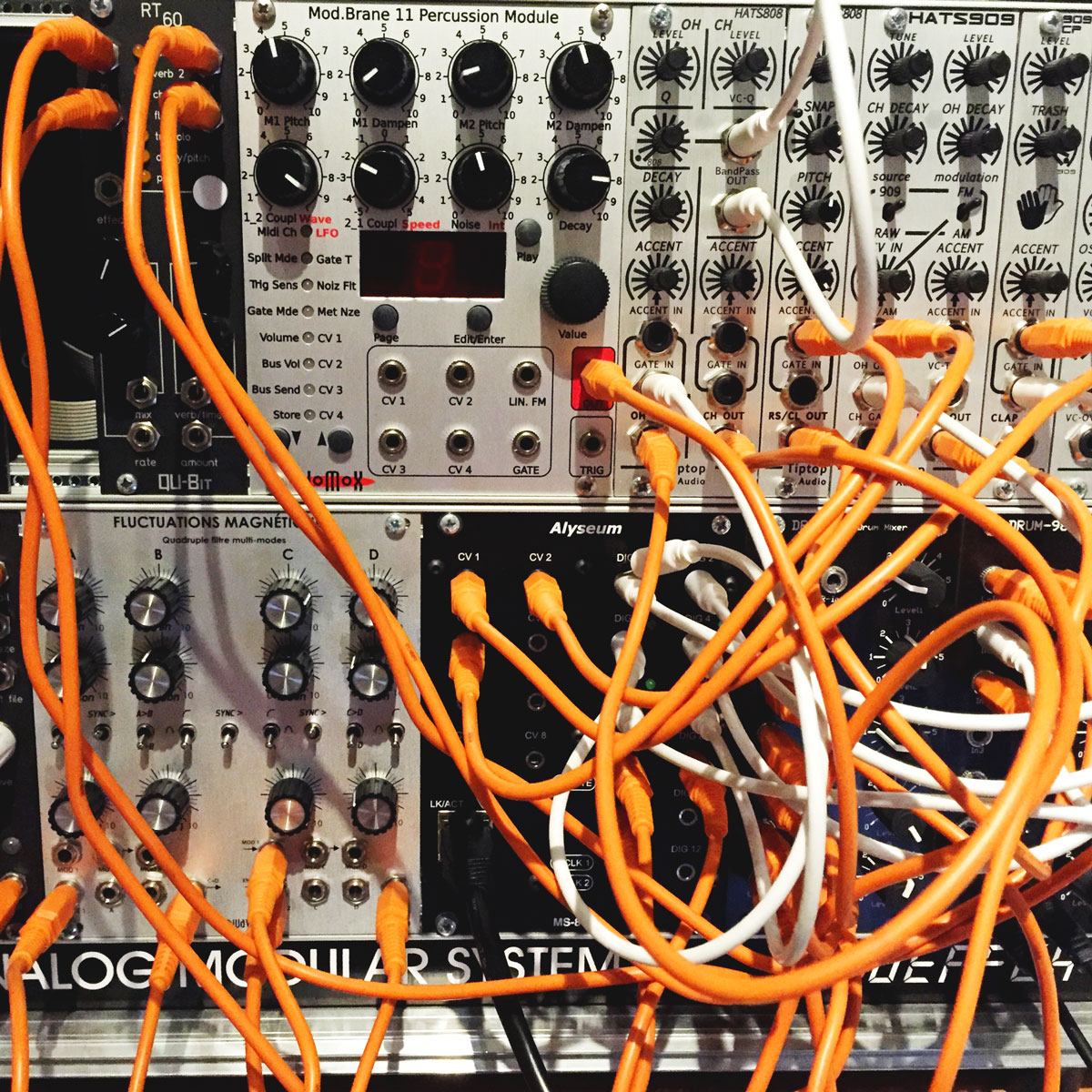
Is your live setup, in regards to Monsieur Georget, the same as the production setup you used in recording the album?
No. There are similarities, but it’s a little different. It’s mainly the modular that’s the same. For live, I put the samples—some parts from the Monsieur Georget album and some unreleased stems—to use in the Elektron (octatrack) and MPC to sequence and sample. It’s essentially two tracks from the LP and some Chris Carrier stuff. I always try to stay on the dancefloor, especially with Monsieur Georget, which has some less danceable stuff on the album.
You’re very relentless in your output. How do you find the constant drive and inspiration?
I don’t know really, it’s just that I feel I need to release music. If I don’t make music for even a couple of days, I feel really strange, you know? It’s always there and I’m always thinking about music. And now that I have kids, I really need to focus on being away from the studio at times because my head is just constantly racing with music. I get a little bit of sleep, just enough to be functioning, because I even dream of my ideas. It never stops. I need to try something different, because there’s always something musical going on in my head. I’ll be in the club, or hear something on the radio, and I instantly think: “Oh that would go good with that!” Or “Wow, that would work well with this machine, or that machine!” There’s always something in my head. And also weed, that always works for inspiration too!
Do you ever hit creative roadblocks and get stuck for ideas?
Yeah of course. If I do too much, then it’s not good and I need to go out and step back. Especially in the summer; sometimes I’ll just stop for a bit because I need some sun. I’ve learnt to know when to stop and to go away for a little bit. But if I “stop,” I’m still doing one track a week, sometimes two or three a week [laughs]. Like with the Robsoul Jazz LP release, Green Age:I was on holiday and was just doing one hour a day and just making lots of edits and stuff. I did the whole LP like that, and it was 20 tracks. Phil weeks kept nine on the LP.
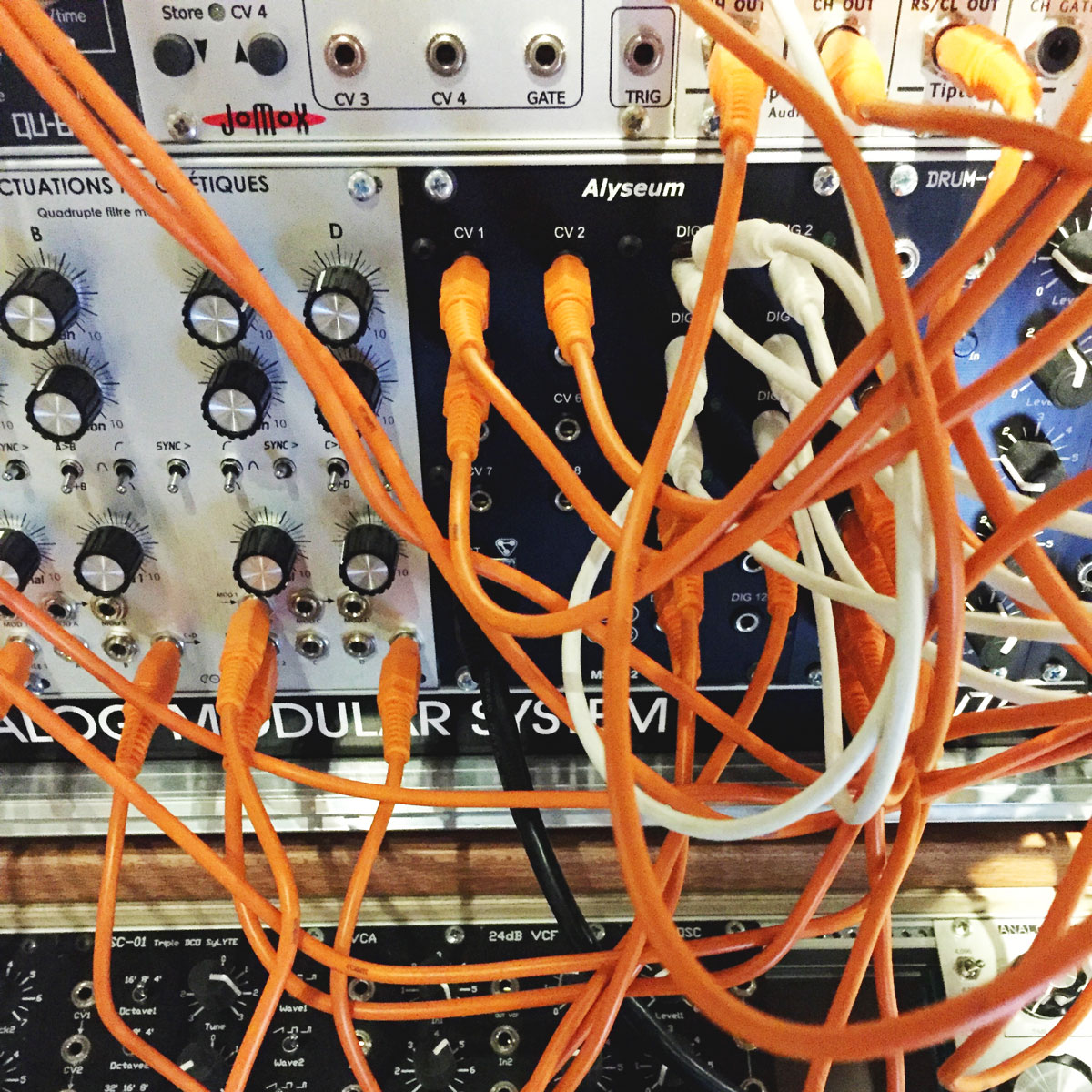
In regards to your different monikers, do you go into the studio with a specific alias in mind? Or do you attach them later?
It depends. If it’s been a long time without making a certain style, then I’ll do that. Or if I’m at a party, like a minimal party, then I might come home and want to make something like that under Monsieur Georget. Or if I get stuck on something, then I go another way.
How much is analog and how much is digital with your current studio?
At the moment, I have a good configuration with my modular and my patch. I use that a lot, and a lot of 909—because the sound is just so good. I have a sampler in my modular setup from Qu-Bit, a company from the USA, called the Nebulæ. It’s my favorite. You can put a USB key inside and for a granular treatment, I use filter and LFO from another module, it’s great. I also use an old sampler from Emu. So my setup is mostly analog at this stage.
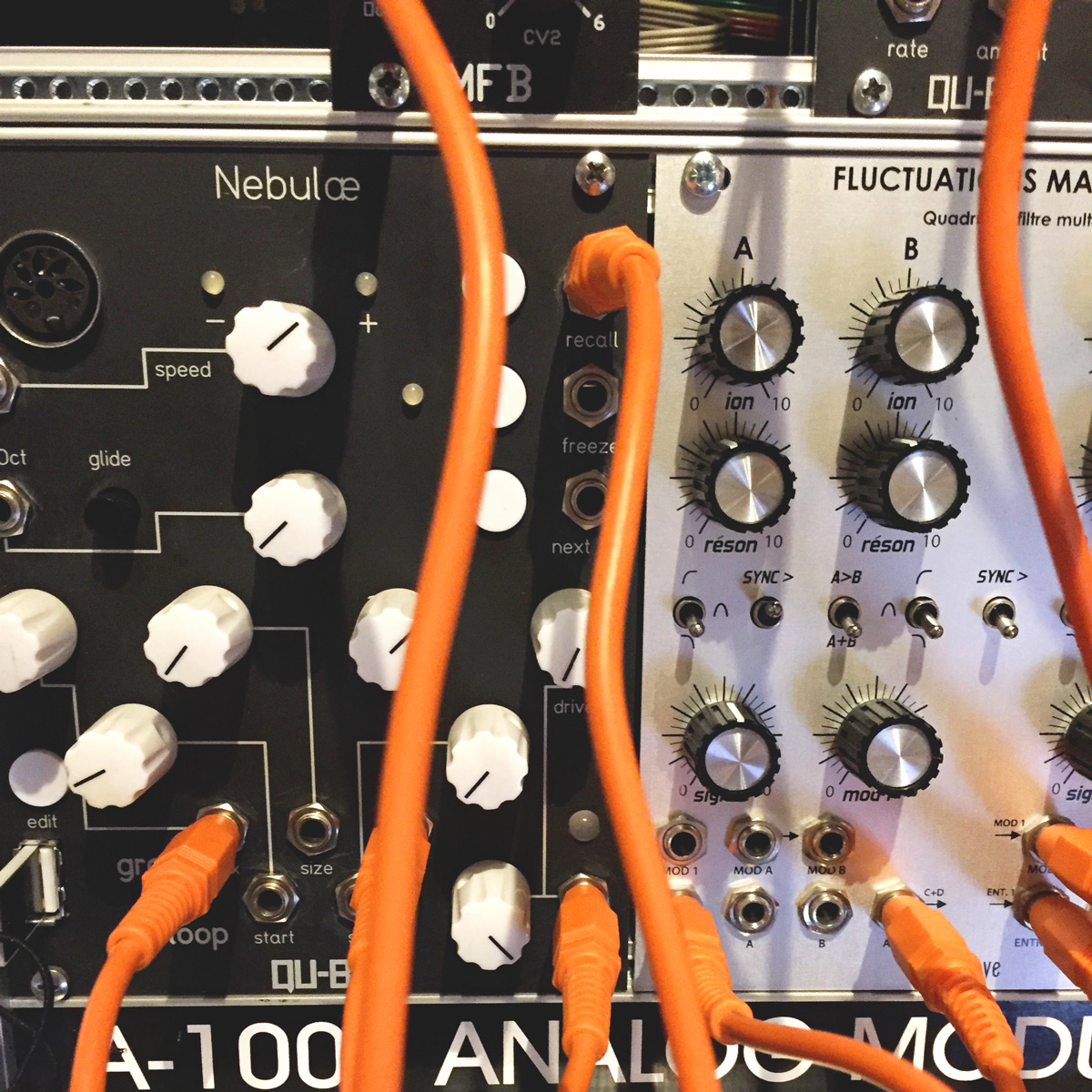
What’s the story behind the Monsieur Georget name?
Ah, it’s funny. I was in a store and I found a cap that read Cycle Georget, and I really love to bike whenever I can. I love it. Around the same time as this, I did a video with Phil Weeks for his Underground Chronicles series, and we needed a new name for me to use. So I put something over my face and I pretended to be this guy named Monsieur Georget, playing vinyl. And the first EP I did for Hold Youth was very minimal and they wanted a different name, so I used Monsieur Georget, and then from then I would produce under that name for the minimal stuff. And it’s also a good nod to my love of bikes!
At the moment, there’s definitely a strong scene in France and Paris in general. Do you feel that?
Yeah, it’s really strong. Recently, I played with a french artist named Bambounou, and another who is a resident at Tresor. They were both really good. Then there are ones that are like family and have known for many years, like Jef K, DJ W!LD, Phil Weeks, all those guys. I’m really happy to see that so many French artists are all working well. And a new favorite from the same agency as me, but he’s not French, is Nicolas Lutz, he’s really good. I respect his music. He’s bringing back the ’90s feeling, and it’s something that I really like.
What else do you have coming up, release wise?
I have a quite a bit on the way actually. My Green Age LP on Robsoul Jazz; the third Opus of my collab with Dan Ghenacia, Vaporized, which will be out on Music For Freaks in June; the Double Lune EP as Monsieur Georget, with remixes from Kamran & Third Chair, on Fasten Musique concrete in April; Flying Sausage on Hudd Traxx in April; an EP on Politics Of Dancing in May; and the Just Groove EP feat Rhythm & Soul in June.
I also have a couple of remixes on the way, Julian Sandre’s Blind Box 03 in April and Mennie on Flashmob Records.
You’ve kindly given away two tracks for download here. When and where were they produced?
“SC06.” This is the original version of the dub included on Sound Carrier 06 EP. I made it sometime last Autumn.
“Breakbeat”: I like to do some interludes, especially some breakbeat/ hip hop instrumentals..I made this one last summer!

